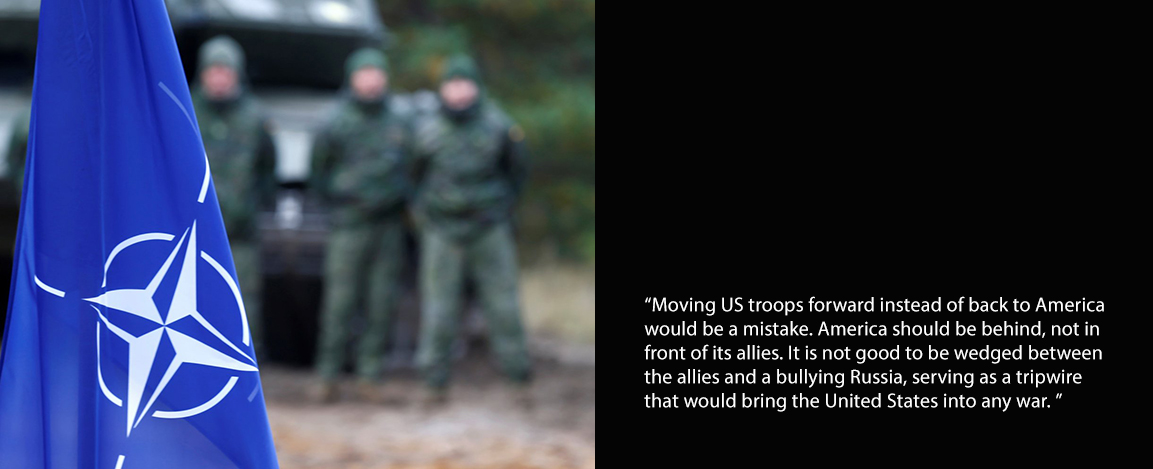These countries should be enticing the French, British and Germans to help them, not Americans who have needs to tend to at home, writes Harvey Sapolsky in a recent article for The National Interest.
Harvey Sapolsky is Professor of Public Policy and Organization, Emeritus at MIT, and the former director of the MIT Security Studies Program.
Artis Pabriks, Latvia’s minister of defense and deputy prime minister, recently made an official offer to host and pay for some of the US troops President Donald Trump has ordered be withdrawn from Germany in a dispute over Germany’s investment in its own defense. Trump had previously complained about Germans not paying enough for the maintenance of the nearly thirty-five thousand US troops stationed in Germany. In June, Trump approved a plan to withdraw ninety-five hundred troops on the rationale that the Germans were not meeting their NATO obligation to devote at least two percent of their GDP to defense. Subsequently, the number to be withdrawn was raised to 11,900. Robert O’Brien, Trump’s national security adviser, later said that these troops should be more forward-deployed to thwart possible Russian aggression.
All of this is music to Latvian ears. Latvia is forward-deployed as it is one of the Baltic States, forcibly converted into Soviet republics from World War II until it regained its independence at the end of the Cold War. Offered NATO membership in 2004, Latvia and the other Baltic States are eager to meet the NATO budget standard even if it is ignored by most of the other member states. Currently, Latvia and the other Baltic States, all small in population, host rotational units from the larger NATO members, the United States included, to augment their own limited capabilities. It is not surprising that Latvia, upon learning that the United States intended to forward-station its forces, was quick to offer to pay some of the associated costs. Other countries are likely to follow with similar proposals. Poland has already made an overture.
Moving US troops forward instead of back to America would be a mistake. America should be behind, not in front of its allies. It is not good to be wedged between the allies and a bullying Russia, serving as a tripwire that would bring the United States into any war. To be sure, America willingly took that role during the Cold War, stationing more than three hundred thousand troops in Western Europe to help protect Europe from an expansionary Soviet Union. Devastated by World War II, the Europeans were too weak to stave off the Soviets without our forces standing between them and Soviet tank divisions. That strategy did work. The Cold War ended peacefully and the Europeans, with US protection, grew prosperous.
Today, Europe in the guise of the European Union, which includes the Baltic States and many former Warsaw Pact allies of the Soviets, has ten times the GDP and three and half times the population of Russia, the inheritor of the Soviet Union’s nuclear weapons and its dictatorial ways. Latvia and the other Baltic States cannot alone hold off the Russians, but collectively the European Union easily can. That is it can unless we do it for them, subsidizing what are now rich Europeans by taking away their incentive to organize and pay for their own defense.
America’s strategy of being behind its allies, not in front of them, worked well for it during World War I and World War II. In World War II, America’s European allies and the Soviet Union wore down the Germans before directly engaging them. Compared to all the other participants in World War II, the United States had a good experience (and a fairly good World War I, too). Holding the line against Russia now would be a much more doable task for the Europeans.
There is no need for the United States to guard Europe against the Russians. The Europeans are rich, numerous, and fully capable of defending themselves. America must resist Latvians or Poles bearing gifts. These countries should be enticing the French, British and Germans to help them, not Americans who have needs to tend to at home. If US troops leave Europe, as they should, then the Europeans will remain friends and allies of the United States because America is their best insurance given that it has saved the Europeans three times over the last century. This time, unless the United States is foolish, it need only watch from a distance.
Harvey Sapolsky is Professor of Public Policy and Organization, Emeritus at MIT, and the former director of the MIT Security Studies Program.




